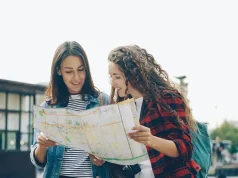
Is your pooch a ruff traveller? With roughly eight in 10 dogs suffering from anxiety1, travelling somewhere new can be a hard time for our furry friends.
Below, experts at Canine Cottages, with help from Janine Pemberthy, Canine Behaviour and Training Manager at animal welfare charity, Battersea, have revealed six top tips to make sure your anxious pooch enjoys pooch-pawfect travel and holidays away from home.
If your dog is feeling anxious, there are easy ways to spot the signs. Common signs of anxiety include:
- Trembling
- Tail-tucking
- Hiding
- Licking and biting
- Pacing
- Ears pinned back
- Diarrhoea
- Panting
- Escaping
1. Choose your location wisely
If your dog becomes anxious around noise and people, then it’s a good idea to search for quieter locations away from busy cities, towns, or resorts. Research destinations carefully and find somewhere to stay that’s in a quiet location, perhaps a cottage hidden away in the countryside with plenty of outdoor space for them to enjoy.
2. Never leave your dog alone when travelling
When travelling to your destination, one of the most important rules is to make sure you never leave your dog alone in the car. Even with a window cracked open, cars become extremely hot in the summer, and it can take just 15 minutes for a dog to suffer from fatal heatstroke. Even in cooler months, leaving your dog alone can leave them vulnerable to theft, so never leave them unaccompanied.
3. Take plenty of water and treats on the journey
Having fresh water during the journey is essential for your dog to keep them hydrated, so make sure you’re giving them some during your breaks. If you are travelling for many hours, make sure you have food to hand, and reward your dog with treats if they’re being good too.
4. Create a safe space for your dog
Being in a new environment can be stressful for dogs, so certain things like sticking to the same feeding and walking routine as you have at home can really help your dog relax and feel calm while away from home. Additionally, setting up temporary fencing for dogs can provide a safe and secure area for them to roam and play, giving them a sense of familiarity and freedom even in a new environment.
As Pemberthy says: “Once you’ve arrived, create a safe, quiet space in a less busy part of the property. This can be made with bedding, blankets and toys brought from home which will smell familiar and help reassure them that everything is OK.”
Make sure you’re giving your dog plenty of love and cuddles which will also help them relax in the unfamiliar environment too.
5. Choose your accommodation well
When looking at a place to stay, it’s important to try and make the space seem like your home. For example, if your dog is used to carpets rather than slippery wooden boards, choose a cottage with fluffy, carpeted flooring so it feels more like their space. And if your dog sleeps in the corner of the room when at home, then find a cosy corner spot for the dog bed too.
Anxious dogs can sometimes make a run for it if they feel stressed, so it’s a good idea to choose a place to stay with an enclosed garden that’s set back from the road to help avoid any traffic. If your dog gets anxious with loud noise, choosing a more secluded area away from roads will also help calm them too.
6. Walk, walk, walk!
It’s no secret that dogs love walks, and they can be a great distraction and sense of release for anxious pooches. Exercise releases feel-good chemicals in dogs (as well as humans) so make sure to be getting out and walking your dog every day when you’re away.
When walking in new places, Pemberthy recommends keeping your dog on a long-line lead: “It’s a good idea to make sure any dog has a solid recall, and will reliably come back to you when called, but this can be especially important with nervous dogs, especially before you head out and about together in new locations.” Pick out a destination with a big, scenic parkland where you can let out a long-line lead for your dog to really stretch their legs.
Commenting, Shannon Keary, Digital PR Manager at Canine Cottages says: “Lockdown and then returning to work made a lot of dogs develop anxiety, especially separation anxiety when away from their owners , and many dogs are nervous travellers too. And with many Brits no doubt embarking on a staycation this year, we wanted to compile these tips to help anyone looking to take their dog on holiday know how to keep their pooches safe and sound while travelling and away from home.”
To find out more about planning a holiday with anxious pooches, please visit: https://www.caninecottages.co.uk/blog/holiday-planning-with-anxious-dogs





